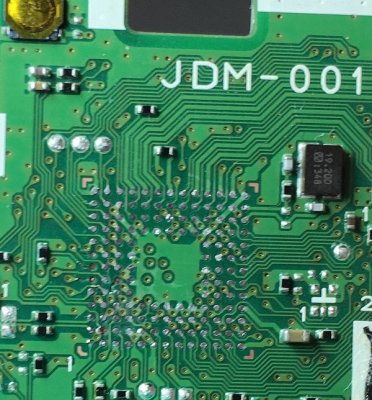Hello @PSXHAX, today PlayStation 4 Developer Zecoxao shared a new GitHub from DS4User containing a DualShock 4 (DS4) PS4 Firmware dump and reverse-engineering tools for other devs to examine! 
Previously, we have seen PS4 Developer J0lama release his DS4 Linux Library to control DualShock 4 Controllers which you can view here if you haven't seen it yet: J0lama's DS4.lib
Github Link for the DS4 Code: DS4 GitHub
Clone/Download: DS4User.git / ds4-master.zip / ds4-master.zip (Mirror) / ds4-master.zip (Mirror #2)
Raw File for Code Below: Raw Code
 From the README.md file: DS4
From the README.md file: DS4
Tools for working with DualShock 4
With fw of controller, it is possible to do interesting things like:
PS4 Jedi “MASTER” Key has been documented by Zecoxao.
This key decrypts DualShock4 firmwares. Algorithm is AES-128-CBC. Zeroed IV.
this set of files should produce the necessary keys for the GP2040-CE PS4 Mode. You can quickly find it via google search but i've decided to put it here for you to use. This will make the device be able to skip 8 minute timeout
From the included README.md:

Previously, we have seen PS4 Developer J0lama release his DS4 Linux Library to control DualShock 4 Controllers which you can view here if you haven't seen it yet: J0lama's DS4.lib
Github Link for the DS4 Code: DS4 GitHub
Clone/Download: DS4User.git / ds4-master.zip / ds4-master.zip (Mirror) / ds4-master.zip (Mirror #2)
Raw File for Code Below: Raw Code
 From the README.md file: DS4
From the README.md file: DS4Tools for working with DualShock 4
With fw of controller, it is possible to do interesting things like:
- flash custom fw to controller
- learn how all aspects of controller works
- implement native pairing on other host devices
- present custom hardware as "official" DS4 to PS4
Code:
'''
fw file:
With fw of controller, it is possible to do interesting things like:
* flash custom fw to controller
* learn how all aspects of controller works
* implement native pairing on other host devices
* present custom hardware as "official" DS4 to PS4
The following code shows how to do the first stage of auth - authenticating
over USB in order to have console send the bluetooth link key and host address.
(C) HAXX
'''
import struct
import binascii
from Crypto.Cipher import AES
from Crypto.Hash import SHA256, CMAC
from Crypto.PublicKey import RSA
from Crypto.Signature import pss
from Crypto.Util.number import bytes_to_long
from Crypto.Random import get_random_bytes
from Crypto.Math.Numbers import Integer
hw_bindings = [
(0x40015fe0, 0x00000004),
(0x40015fe4, 0x00000018),
(0x40015fe8, 0x00000014),
(0x40015fec, 0x00000000),
(0x40015ff0, 0x0000000d),
(0x40015ff4, 0x000000f0),
(0x40015ff8, 0x00000005),
(0x40015ffc, 0x000000b1),
(0x4002f000, 0xf3b002c0),
(0xe00fffe0, 0x00000034),
(0xe00fffe4, 0x0000004a),
(0xe00fffe8, 0x00000008),
(0xe00fffec, 0x00000000),
(0xe00ffff0, 0x0000000d),
(0xe00ffff4, 0x00000010),
(0xe00ffff8, 0x00000005),
(0xe00ffffc, 0x000000b1),
]
bldr_key_blob = bytes([0x39, 0xFF, 0x1A, 0x67, 0x2B, 0x4F, 0x99, 0xA6, 0xA1, 0xCA,
0x65, 0xC2, 0x99, 0xD6, 0x27, 0x0C, 0x7D, 0x4E, 0x1A, 0xF9,
0x10, 0x36, 0xAD, 0x6C, 0x8D, 0x20, 0xEA, 0xD1, 0xFF, 0x33,
0xD9, 0x03, 0x94, 0xFD, 0x44, 0x15, 0xB5, 0x40, 0x72, 0xD9,
0xC8, 0x3B, 0x94, 0x99, 0x43, 0x04, 0xFD, 0x49])
app_key0_blob = bytes([0x3E, 0x5C, 0x05, 0xC6, 0xAF, 0xAF, 0xAB, 0x02, 0x20, 0x3B,
0x3D, 0x18, 0x17, 0x33, 0xDD, 0xCB, 0xA9, 0x65, 0x40, 0x0F,
0xD5, 0x3A, 0x6F, 0x50, 0x17, 0x31, 0xF3, 0x86, 0x55, 0xB2,
0x08, 0x08, 0xCF, 0xB8, 0xE6, 0x18, 0x1C, 0xC9, 0x1D, 0x64,
0xC4, 0x99, 0x3B, 0x04, 0x0B, 0xEC, 0xC7, 0xB5, 0xED, 0x18,
0xA5, 0x68, 0x3A, 0x95, 0xA3, 0x38, 0xF3, 0xCA, 0x32, 0x55,
0x28, 0xA9, 0x6F, 0xCB])
app_key1_blob = bytes([0x7F, 0x81, 0x48, 0x8F, 0x32, 0x02, 0x4C, 0x6B, 0xF5, 0xD9,
0x99, 0x92, 0x87, 0x98, 0xAE, 0xC0, 0x78, 0x5F, 0xC3, 0xE6,
0x1B, 0xAF, 0x32, 0xDF, 0xA5, 0x83, 0x3F, 0x43, 0x49, 0x64,
0xCD, 0x53, 0x37, 0x52, 0x52, 0x39, 0xB1, 0x0B, 0xF8, 0x38,
0xEF, 0x29, 0xB3, 0x7E, 0xBD, 0x73, 0xD9, 0x51, 0x1E, 0xC4,
0xDF, 0xFB, 0x97, 0x25, 0xA1, 0xE9, 0xD2, 0x67, 0x89, 0x90,
0xA0, 0x3C, 0x28, 0x32])
# pubkey of the CA which signs controller keys
jedi_CA_pubkey = RSA.construct((bytes_to_long(bytes([
0x8E, 0xD7, 0xF9, 0xE4, 0xAA, 0x5C, 0xC5, 0xD2, 0x31, 0x96,
0xF0, 0xDE, 0x79, 0x7D, 0xFE, 0xAC, 0xF6, 0x3E, 0xDE, 0x7B,
0xC9, 0x67, 0x16, 0xF1, 0x3C, 0xF5, 0x2A, 0xDE, 0xF8, 0xDA,
0xCF, 0xA8, 0xE2, 0x33, 0xDC, 0x65, 0x57, 0x17, 0x34, 0x7D,
0x4C, 0x8C, 0x82, 0x6E, 0xAB, 0x90, 0x36, 0x16, 0xFF, 0x9F,
0xB8, 0xF9, 0x73, 0x36, 0x17, 0xFB, 0xD4, 0x4E, 0xC8, 0x10,
0x78, 0xAD, 0x6E, 0x24, 0xB0, 0x62, 0x61, 0x9F, 0x5A, 0x17,
0xEE, 0x2F, 0x55, 0x72, 0xB4, 0x27, 0xC0, 0x34, 0xA9, 0x49,
0x36, 0x3E, 0x86, 0xD3, 0xB2, 0x13, 0x35, 0x1F, 0x89, 0x04,
0xA4, 0x99, 0xF8, 0x62, 0x40, 0x1F, 0x4E, 0x60, 0xAC, 0x21,
0x31, 0xCD, 0x4B, 0xB9, 0xFD, 0xDF, 0xD5, 0x90, 0xC8, 0xE2,
0x2B, 0x7D, 0xF9, 0x6D, 0x01, 0x5A, 0x41, 0xC5, 0x49, 0xF3,
0xEA, 0x0D, 0xED, 0xFC, 0x32, 0xCE, 0xC3, 0x2D, 0x72, 0xC5,
0x34, 0x93, 0x4A, 0xEF, 0x3D, 0xD1, 0x2B, 0x58, 0xDB, 0x35,
0x7D, 0xD0, 0x4D, 0x9A, 0x93, 0x11, 0xA3, 0x83, 0x3F, 0xF8,
0x55, 0x7A, 0x0B, 0x85, 0xB4, 0x54, 0xCD, 0x21, 0xDA, 0xB9,
0x0D, 0x71, 0x4A, 0xEA, 0x2D, 0xEC, 0x42, 0xE6, 0xF4, 0xEF,
0x20, 0x45, 0x3C, 0xF6, 0xDB, 0xF3, 0x95, 0x4E, 0x73, 0xA8,
0x76, 0x91, 0xCF, 0xA0, 0x3F, 0x47, 0x59, 0x45, 0x5C, 0x8B,
0x96, 0xF1, 0xD0, 0xB6, 0x9D, 0xD3, 0xDD, 0x62, 0x62, 0xE9,
0x43, 0x8D, 0xCC, 0x26, 0x96, 0xCF, 0xE6, 0x4B, 0x93, 0x0C,
0x6E, 0x7D, 0x4E, 0x01, 0x51, 0xF6, 0xD1, 0xB1, 0x5D, 0x1A,
0x4B, 0xE2, 0xE6, 0x0F, 0x0B, 0x36, 0x11, 0x8C, 0x60, 0xF2,
0x53, 0xFD, 0xBC, 0xE2, 0x27, 0xA8, 0xA4, 0xC9, 0xCD, 0xF2,
0x26, 0x08, 0x58, 0x58, 0x4A, 0xB8, 0xD7, 0x1C, 0x62, 0x9C,
0xD4, 0x21, 0xEC, 0x66, 0x60, 0x59])), 0x10001))
def get_hw_binding():
binding = []
for addr, val in hw_bindings:
binding.append(struct.pack('<L', val))
return b''.join(binding)
def unwrap_key_blob(blob):
return HwKey().decrypt_and_verify(blob)
class JediKey:
def decrypt(s, buf): return AES.new(s.key, AES.MODE_CBC, s.iv).decrypt(buf)
def verify(s, buf):
content, mac = buf[:-0x10], buf[-0x10:]
CMAC.new(s.cmac_key, ciphermod=AES, msg=content).verify(mac)
return content
def decrypt_and_verify(s, buf): return s.verify(s.decrypt(buf))
class HwKey(JediKey):
def __init__(s):
s.key = SHA256.new(get_hw_binding()).digest()[:0x10]
s.cmac_key = s.key
s.iv = b'\0' * 16
class BldrKey(JediKey):
def __init__(s):
blob = unwrap_key_blob(bldr_key_blob)
# decrypts fw image with {key=blob[0:0x10], iv= 0}
# verifies fw image with {cmac_key = blob[0x10:0x20]}
s.key, s.cmac_key, s.iv = blob[:0x10], blob[0x10:0x20], b'\0' * 16
class AppKey(JediKey):
def __init__(s, key_id):
assert key_id in (0, 1)
blob = unwrap_key_blob(app_key0_blob if key_id == 0 else app_key1_blob)
s.key, s.iv, s.cmac_key = blob[:0x10], blob[0x10:0x20], blob[0x20:0x30]
class JediCert:
def __init__(s, cert_file):
s.serial = str(cert_file[0x5a0:0x5a0 + 0x10], 'ascii')
s.key = s.construct_key(s.decrypt(cert_file[:0x5a0]))
def decrypt(s, buf):
for i in range(2):
try:
return AppKey(i).decrypt_and_verify(buf)
except ValueError:
pass
raise Exception('failed to decrypt cert')
def construct_key(s, buf):
''' binary format is:
u8 serial_bin[0x10]
u8 n[0x100]
u8 e[0x100]
u8 sig[0x100]
u8 p[0x80]
u8 q[0x80]
u8 dp[0x80]
u8 dq[0x80]
u8 qinv[0x80]
'''
pos = 0
serial_bin = buf[pos:pos + 0x10]
pos += 0x10
n = buf[pos:pos + 0x100]
pos += 0x100
e = buf[pos:pos + 0x100]
pos += 0x100
sig = buf[pos:pos + 0x100]
pos += 0x100
p = buf[pos:pos + 0x80]
pos += 0x80
q = buf[pos:pos + 0x80]
# extraneous sanity check
assert binascii.unhexlify(s.serial) == serial_bin[-8:]
# our serial number and pubkey should be validly signed by the CA
pss.new(jedi_CA_pubkey).verify(SHA256.new(serial_bin + n + e), sig)
n = bytes_to_long(n)
e = bytes_to_long(e)
p = bytes_to_long(p)
q = bytes_to_long(q)
key = RSA.construct((
n, e,
Integer(e).inverse((p - 1) * (q - 1)), p, q
))
#open('./jedi_cert.bin', 'wb').write(buf)
return key
def sign(s, msg):
return pss.new(s.key).sign(SHA256.new(msg))
class JediFlash:
def __init__(s, path):
s.path = path
s.verify_fw()
s.cert = JediCert(s.read_interleaved(0x5000, 0x800))
def verify_fw(s):
with open(s.path, 'rb') as f:
f.seek(0x8000)
BldrKey().verify(f.read(0x38000))
def read_interleaved(s, addr, size):
assert (addr % 4) == 0
assert (size % 4) == 0
with open(s.path, 'rb') as f:
f.seek(addr)
buf = []
while size > 0:
buf.append(f.read(4))
f.seek(4, 1)
size -= 4
return b''.join(buf)
if __name__ == '__main__':
flash = JediFlash('./jedi_flash-Aug_3_2013.bin')
cert = flash.cert
# example of what usb auth does
# console gens and sends the nonce..
nonce = get_random_bytes(0x100)
# controller signs it and sends back pubkey and sig
jedi_sig = cert.sign(nonce)
# console checks sig...
pss.new(cert.key.publickey()).verify(SHA256.new(nonce), jedi_sig)
print(r'\o/')
# now, console will send controller bt link key + host addr
# then controller must respond to bt challenges, but they are much more
# simple
Code:
Key: 9B03D4FB5FEC1A2373462C45E4BC72A6this set of files should produce the necessary keys for the GP2040-CE PS4 Mode. You can quickly find it via google search but i've decided to put it here for you to use. This will make the device be able to skip 8 minute timeout
- ds4-master-custom-lJArAqXq.zip (789.79 KB - includes ds4sig.bin, jedi_crypto.py, jedi_crypto-mod.py, jedi_flash-Aug_3_2013.bin, jedi_flash, Aug_3_2013.idc, jedi_tool.py and ps4nonce.bin via GodzIvan)
From the included README.md:
Code:
# ds4
Tools for working with DualShock 4
With fw of controller, it is possible to do interesting things like:
* flash custom fw to controller
* learn how all aspects of controller works
* implement native pairing on other host devices
* present custom hardware as "official" DS4 to PS4
- GodzIvan -
Working ????
